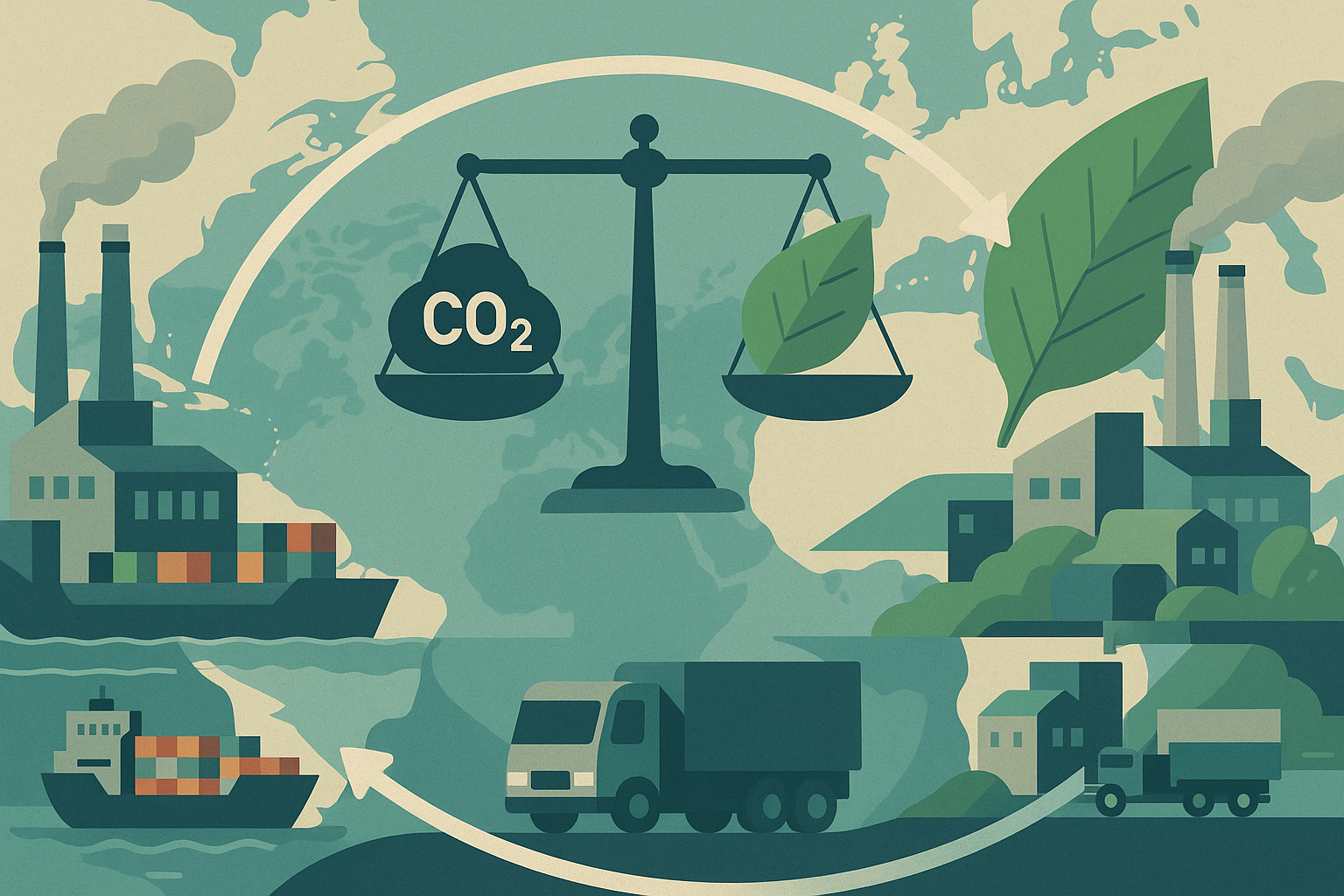By Mat Langley
•
July 15, 2025
Introduction Global supply chains are being reimagined through the lens of both resilience and sustainability. Recent crises – from pandemic disruptions to geopolitical conflicts – have exposed the vulnerabilities of far-flung sourcing models. In response, many firms are turning to “strategic shoring” – relocating production closer to home via nearshoring or reshoring – as a way to bolster supply continuity. Proximity can indeed reduce lead times and exposure to global shocks, and it’s often assumed to cut carbon footprints by slashing transport distances. However, a closer look reveals a complex trade-off : shorter supply lines don’t automatically guarantee lower lifecycle emissions. In fact, if poorly managed, shoring strategies might increase total Scope 3 emissions even as they improve agility. This thought-leadership piece explores the drivers behind the nearshoring trend, the tension between location and carbon impact, and the crucial role sustainable procurement must play in navigating these trade-offs. Drivers Behind the Nearshoring Surge Several converging forces are propelling companies to rethink where they source and produce goods: Supply Chain Resilience: The COVID-19 pandemic and the war in Ukraine sent shockwaves through global logistics, prompting a shift from “just-in-time” to “just-in-case” thinking. By moving manufacturing closer to end markets, firms hope to reduce dependence on distant suppliers and respond faster to disruptions. Nearshoring and reshoring build buffers against port closures, shipping delays, and other uncertainties. Geopolitical Risks: Heightened trade tensions (e.g. U.S.–China tariffs) and regional conflicts have made long global supply routes less predictable. In this volatile landscape, diversifying or relocating supply chains to politically stable, friendly jurisdictions is seen as a strategic hedge. For example, North American companies are increasingly favoring Mexico for its shared border and trade agreements with the U.S., rather than more distant Asian manufacturing hubs. Regulatory and Policy Pressures: Emerging climate policies and trade rules are raising the stakes. Companies must consider exposure to carbon-focused regulations – for instance, Europe’s Carbon Border Adjustment Mechanism (CBAM) will from 2026 impose a carbon price on certain imports tied to the EU’s Emissions Trading System. This effectively penalizes high-carbon overseas production and incentivizes trading partners to decarbonize their manufacturing. Likewise, the EU’s new Corporate Sustainability Reporting Directive (CSRD) is making Scope 3 emissions disclosure mandatory , forcing firms to reveal and manage their supply chain carbon impacts. These measures create a push to localize production in cleaner grids or at least source from suppliers with lower emissions, to avoid future tariffs, reporting headaches, or brand risk. Investor and Consumer Expectations: ESG-minded investors and eco-conscious customers are pressuring companies to improve their supply chain footprints. Offshoring over the past decades often meant shifting production to regions with lower costs and laxer environmental standards – effectively offshoring pollution to countries with fossil-heavy energy and weaker regulations. Now, stakeholders are demanding change. In a PwC survey, 50% of investors even said they would divest from companies not taking sufficient ESG action. This external scrutiny makes supply chain geography a matter of reputation : sourcing closer to home in jurisdictions with strong environmental protections can signal a commitment to sustainability. Taken together, these drivers explain why nearshoring has gained such momentum. A 2024 industry report noted that manufacturers view nearshoring as a way to “protect operations while also making them more sustainable,” aligning with climate goals and compliance requirements. However, the assumption that simply cutting distance automatically cuts carbon is too simplistic , as we explore next. Proximity vs. Lifecycle Emissions: The Hidden Carbon Trade-off A core premise of nearshoring is that shorter transport routes mean lower emissions. It’s true that bringing production geographically closer can shrink the transportation footprint – especially if it avoids emissions-intensive modes like aviation or long trucking hauls. For instance, relocating a supplier from Asia to within Europe or North America can eliminate thousands of miles of freight movement. But how big is the transportation slice of the carbon pie? In many product life cycles, surprisingly small. Efficient global shipping networks achieve huge economies of scale: ships carry ~80% of world trade by volume yet account for only about 6% of transport-sector CO₂ emissions. In other words, moving goods via sea freight is relatively carbon-efficient per ton-mile. The bulk of emissions for most products often comes from raw material extraction, manufacturing processes, and electricity use – not from the final leg of distribution. By one estimate, logistics and transport activities contribute only ~5.5% of total anthropogenic greenhouse emissions. This means that focusing only on proximity can mislead companies on climate impact. If a firm nearshores manufacturing but the new location uses a carbon-intensive energy mix or less efficient technology, the net result may be higher lifecycle emissions despite saving on transport fuel. As a sustainability manager at apparel brand Schöffel put it, “The choice of location is not always decisive for low CO₂ emissions. The energy mix at the production site also plays a role.”. A factory running on coal-fired power next door might emit far more CO₂ per unit than an overseas facility powered by renewables. In such cases, shorter supply lines could actually raise total Scope 3 emissions . There’s also the issue of incomplete localization . Nearshoring often doesn’t mean your whole value chain is now local; critical components or materials may still be sourced globally. Consider a scenario: a company shifts final assembly of a product from Asia to the US for resilience. If the sub-components still come from overseas suppliers, those parts now travel twice (to the US instead of within Asia), possibly adding transport legs. Plus, the new assembly plant might be smaller-scale or less specialized, resulting in lower efficiency or more waste. Without a holistic redesign, you risk a carbon backfire – higher upstream and midstream emissions overshadowing the modest cut in shipping fuel. Real-world examples bear out these nuances. In the consumer goods sector, some brands proudly nearshore production to developed regions with cleaner grids, yielding genuine carbon benefits – but only when paired with careful supply chain design. Italian cycling apparel maker Santini is a case in point: they produce high-quality garments in Italy with ~150 local employees and “Kilometer Zero” local material suppliers, explicitly to keep transport emissions minimal. Thanks to access to European renewable energy and short delivery routes, Santini demonstrates that nearshoring can succeed environmentally. On the other hand, consider Mexico’s booming nearshoring scene for U.S. manufacturers. Mexico offers proximity and trade perks, yet sustainability can suffer if underlying conditions aren’t addressed. The country’s northern industrial zones face severe water stress and a fossil-fuel-heavy power grid, which the government has prioritized over renewables. In 2020 a major brewery project in Baja California was halted over water shortages, and even a planned $5B Tesla Gigafactory raised red flags about local water and energy capacity. A company moving production to that region might avoid transoceanic shipping emissions, only to incur a larger carbon footprint per unit due to inefficient, carbon-intensive utilities – not to mention contribute to local drought risks. These examples highlight that nearshoring is no silver bullet unless lifecycle factors (energy sources, resource constraints, transport mode choices) are carefully weighed alongside distance. Scope 3 Emissions and the Risk of Shoring Missteps Offshored supply chains have long allowed companies to mask their full carbon impact – out of sight, out of mind. But with Scope 3 now in the spotlight, there’s no hiding. Supply chain emissions (Scope 3) typically account for the vast majority of a company’s footprint – often 70% to 90% in consumer-facing industries. This means a well-intentioned reshoring move can inadvertently increase total emissions if it’s not guided by carbon intelligence. We’ve seen how focusing on transport emissions alone is insufficient. The bigger peril is shifting emissions around rather than reducing them : so-called carbon leakage. If nearshoring means moving production from a region with a cleaner energy grid to one with a dirtier grid (or from a very efficient factory to a less efficient one closer by), the carbon “savings” from shorter transport can be wiped out and then some. Furthermore, a rushed shoring strategy can create fragmented operations that increase emissions. For example, splitting production across more regional facilities could lose economies of scale or force duplication of carbon-intensive processes. A poorly managed transition might also disrupt existing supplier improvement programs – you might abandon an Asian supplier who had begun investing in renewable energy, only to onboard a nearer supplier with no green initiatives in place. The result is a net setback in decarbonization. In short, without a data-driven approach, there is a real risk that resilience gains come at the cost of a higher Scope 3 carbon bill . An illustrative cautionary tale comes from the 1990s maquiladora boom along the U.S.-Mexico border. This early form of nearshoring saw U.S. companies set up manufacturing just across the border. It certainly achieved proximity and lower costs – but also led to major environmental backfire when not managed responsibly. Lax enforcement allowed rampant air and water pollution, toxic waste dumping, and health crises in border communities. What was “near” for U.S. firms still outsourced pollution to a jurisdiction with weaker oversight, causing local emissions and social damage. Today’s nearshoring wave must not repeat those mistakes. It’s a reminder that moving production closer doesn’t inherently make it cleaner – proactive measures are needed to ensure a sustainable outcome. Sustainable Procurement: The Carbon Intelligence Advantage This is where sustainable procurement emerges as a strategic lever. Procurement teams sit at the nexus of these decisions – choosing suppliers, setting criteria, and defining how trade-offs are managed. By bringing a decarbonization lens to sourcing strategy, procurement can turn strategic shoring into a climate opportunity rather than a liability. Key ways procurement can lead include: Holistic Carbon Assessments: Sustainable procurement means expanding the definition of “best value” to include carbon performance. Instead of assuming local = low-carbon, procurement should analyze full product carbon footprints across different sourcing options . This requires gathering data on suppliers’ energy usage, process emissions, and transportation modes. Modern tools like life-cycle assessment (LCA) software and digital supply chain twins can model scenarios – e.g. What if we source component X from a factory in Region A vs Region B? – capturing not just distance but electricity grids, fuel types, etc. Such analysis often reveals counterintuitive results: a distant supplier with hydroelectric power may score better than a nearby one on a coal-powered grid. Supplier-Specific Carbon Data: Gone are the days of relying solely on industry-average emission factors. Sustainable procurement professionals are increasingly demanding granular, supplier-specific carbon data to inform decisions. In fact, procurement teams now regularly request product-level carbon footprints from vendors as part of the RFP/RFI process. This push for primary data is critical to uncover differences between suppliers and to hold them accountable. For instance, two steel suppliers might offer equivalent quality and price, but if one can document that its steel has 30% lower CO₂ per ton (thanks to electric arc furnaces and scrap-based production), that supplier should have a competitive edge. By requiring this information, procurement not only picks better partners but also signals to the market that carbon transparency and performance are the new currency . Embedding Carbon Costs into Sourcing Decisions: An even more direct lever is to put an explicit price on carbon in procurement. Some forward-thinking organizations have started to integrate an internal carbon price when evaluating supplier bids. For example, participants in a Sustainable Procurement initiative agreed to add a cost term for supplier emissions in tender evaluations: Total Cost = Supplier Price + (Supplier’s carbon footprint × Carbon Price). At a suggested carbon price of €50/ton (aligned with EU carbon markets and expected to rise), this mechanism can sway decisions toward low-carbon suppliers. In practice, it means a bid from a factory running on coal power would face a financial handicap compared to a bid from a renewable-powered facility. Such carbon-cost integration turns sustainability into a quantified factor in award decisions, incentivizing suppliers to invest in decarbonization to stay competitive. It’s procurement operationalizing the idea that carbon has a cost – either now or soon – so better to account for it upfront. Supplier Engagement & Capability Building: Sustainable procurement isn’t just about picking the lowest-carbon option today; it’s about actively improving the supply base for tomorrow. This involves deep supplier engagement to reduce emissions at source. Procurement can set standards (e.g. requiring a percentage of renewable energy use, or mandating certain efficiency measures) and work with suppliers to achieve them. Leading companies provide training, technical support, or even co-investment to help suppliers cut emissions. For instance, a purchaser might help a key supplier secure financing for solar panels or collaborate to optimize logistics routes for fewer empty miles. By treating suppliers as partners in decarbonization, procurement can ensure that both local and global suppliers are on a path to lower emissions. This is especially important if a company maintains a dual supply strategy (keeping some offshore suppliers for cost or capacity reasons while building up nearshore ones). All suppliers, near or far, should be part of the sustainability journey. Carbon Intelligence & AI Tools: The rise of AI and advanced analytics is a game-changer for Scope 3 management. New AI-driven platforms can crunch vast amounts of data to spot carbon hot spots and optimization opportunities across the value chain. For example, machine learning models can fill in data gaps where suppliers don’t provide information, by predicting emissions based on similar factory profiles or regional stats. According to recent reports, AI tools are now automating emissions data collection and even customizing carbon calculations to specific supplier contexts. This helps procurement swiftly compare scenarios and identify the most impactful interventions. An AI might reveal that Supplier X has a higher footprint per unit due to outdated equipment – flagging an opportunity to either engage X on upgrades or shift volume to Supplier Y. The evolution of such carbon intelligence tools means procurement teams can make more informed, granular decisions at scale. In fact, the World Economic Forum estimates AI could help cut global greenhouse gases by 5–10% by optimizing systems and processes. Embracing these digital solutions enables procurement to guide shoring strategies with hard data rather than gut feel. Nearshoring Done Right: Case Studies and Cautionary Tales Let’s consider a few brief case snapshots that illustrate the spectrum of outcomes when nearshoring is approached through a sustainability lens: Success Story – Local Production with Renewables: Company A, an outdoor apparel brand, shifted part of its production from Asia to Eastern Europe to shorten lead times. Crucially, they chose a supplier in Czech Republic – a location that, according to a Savills index, offers not only lower wages than Western Europe but also stronger ESG performance than typical developing-nation suppliers. The Czech factory is powered largely by nuclear and hydro electricity, dramatically cutting manufacturing emissions versus the previous coal-powered Asian factory. Simultaneously, Company A worked with this supplier to optimize material use and utilized rail freight for inbound components, avoiding higher-carbon air shipments. The result was a nearshoring win-win: resilience improved and the product’s total carbon footprint dropped. This case underscores that supplier selection within nearshoring is pivotal – it’s not just about moving closer, but moving into a cleaner ecosystem. Cautionary Tale – Nearshoring Without Carbon Due Diligence: Company B, a consumer electronics firm, decided to reshore assembly of its devices to the U.S. from China, after trade tensions and long shipping delays. However, in its haste to reduce dependence on Asia, the company overlooked the carbon implications. The new U.S. assembly plant had to import numerous components from Chinese and Taiwanese suppliers (who themselves relied on coal-heavy energy). Those parts now traveled across the Pacific twice – once as components and again embedded in the final product for U.S. distribution. Additionally, the U.S. facility’s electricity came from a grid dominated by natural gas, whereas the former Chinese assembly partner had been part of a renewable energy pilot program. An internal audit later revealed that the Scope 3 emissions per product actually increased after reshoring. This “carbon whiplash” occurred because Company B failed to map out the end-to-end footprint change; they assumed local assembly was greener by default. The lesson? Strategic shoring without carbon accounting can backfire , and initial assumptions must be validated with data. Mixed Outcome – Nearshoring Hits Local Constraints: Company C moved production of a line of beverage products from Asia to a facility in northern Mexico, aiming to capitalize on quick trucking into the U.S. market. This did cut down shipping time and cost. Yet, the region’s chronic water scarcity created a new sustainability issue – the plant’s water use strained local supplies, leading to community pushback and eventual government intervention to limit industrial water permits. At the same time, Mexico’s slow progress on renewable energy meant the plant’s electricity was high in CO₂ intensity. Company C ended up purchasing renewable energy credits and investing in local water infrastructure to mitigate these problems, raising their operating costs. The nearshoring move wasn’t a failure – it achieved the primary goal of resilience – but it taught the company that environmental conditions in the host region can make or break sustainable performance . Going forward, they now incorporate local climate risk and infrastructure readiness into site selection. These examples highlight that results can vary widely. The difference lies in whether companies apply sustainability foresight to their shoring decisions. Nearshoring can absolutely advance decarbonization – for example, when it enables using greener power, cleaner logistics, or closer oversight of production practices. But it can also just shift emissions or create new environmental burdens if done carelessly. Sustainable procurement is the guardrail ensuring strategic shoring fulfills its promise rather than creating new problems. Looking Ahead: Rethinking “Shoring” in the Climate Era As we move further into the 2020s, procurement and supply chain leaders face a defining challenge: how to reconcile the drive for supply chain resilience with the imperative of deep decarbonization. The old playbook of chasing low-cost labor around the globe has given way to a more complex equation – one that factors in carbon costs, climate risks, and regulatory constraints. Going forward, procurement teams should approach nearshoring/reshoring decisions as climate decisions every bit as much as business decisions. That means asking nuanced questions at the strategy table: Will moving this supply improve our overall carbon footprint or just relocate it? How will this choice hold up when carbon prices rise or when Scope 3 transparency is mandated? Can we secure renewable energy and sustainable inputs in the new location? What support will our suppliers need to hit our emission targets? Every “shoring” initiative should be evaluated against the company’s science-based climate goals, not in isolation from them. Policy trends will only sharpen the need for this integrated thinking. Besides CBAM and CSRD in Europe, other regions are considering similar moves – for example, the United States is discussing its own border carbon adjustments and implementing the Inflation Reduction Act’s incentives for local clean manufacturing. Carbon pricing schemes are spreading in Asia and the Americas. In short, carbon will increasingly carry a financial tag in global trade. A supply chain configuration that seems cost-effective today could become a liability if it carries a heavy carbon toll under future regulations or carbon taxes. Forward-looking procurement leaders are already mapping their supplier base against such scenarios. Those that proactively optimize for carbon will be ahead of the curve (and may even turn their low-carbon supply chains into a competitive advantage in carbon-conscious markets). Finally, an emerging ethos can guide shoring decisions: “Think globally, act locally” – but in a climate context. This means maintaining a global perspective on where your value chain can be most sustainable, while taking local actions to reduce emissions wherever you operate. In practice, it could translate to a dual strategy: intensifying sustainability efforts with far-flung suppliers who remain in your network (driving improvements in Asia or Africa, for example), and investing in local or regional supply options for critical areas, built from the ground up with low-carbon infrastructure. It’s not an all-or-nothing proposition. The goal is a resilient and low-carbon supply ecosystem, which may involve a blend of near, far, and intermediate sourcing – optimized through data and regularly re-evaluated as conditions change. Procurement has a pivotal role to play as the orchestrator of this balance. By leveraging data, supplier relationships, and policy insight, procurement can ensure that strategic shoring decisions are made not on impulse or intuition, but on a rigorous assessment of climate impact alongside other factors. The tone for the next decade will be set by those leaders who are unafraid to challenge the old assumptions – for example, speaking up when a proposed reshoring might harm sustainability, or conversely championing an unconventional supplier because it offers a lower-carbon solution despite a longer distance. In conclusion, nearshoring and reshoring can be powerful tools in building more resilient, transparent supply chains – but in the context of climate change, they must be executed with carbon intelligence . Sustainable procurement professionals will be the ones to ask the hard questions and crunch the numbers that make the difference. By doing so, they will help their organizations avoid greenwashed knee-jerk moves and instead deliver genuine progress: supply chains that are not only closer and safer, but also aligned with our collective decarbonization path. In the era of net-zero commitments and carbon-accountable commerce, rethinking supply chain strategy is not just prudent – it’s paramount. The companies that get this right will turn sustainability into a source of supply chain strength, proving that resilience and decarbonization can advance hand in hand. The ones that get it wrong may find that in solving yesterday’s risks, they’ve created new ones for tomorrow. The charge for procurement is clear: lead the way in marrying the “where” with the “how” – ensuring that strategic shoring truly serves our climate goals as well as our business goals. Sources: Sustainable supply chain reports and industry analyses, policy briefs on CBAM/CSRD, and case studies on nearshoring impacts.











